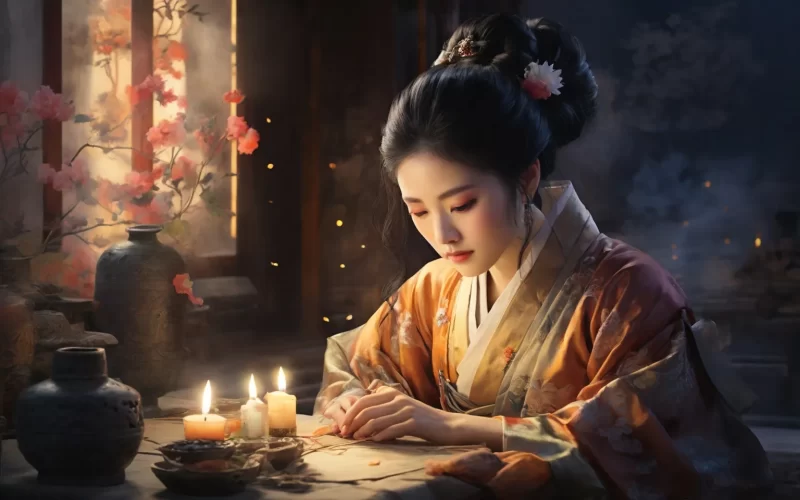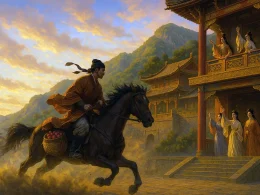When the Emperor sought guidance from wise men, from exiles,
He found no calmer w i sdom than that of young Chia
And assigned him the foremost council-seat at midnight,
Yet asked him about gods, instead of about people.
Original Poem
「列女操」
孟郊
梧桐相待老,鸳鸯会双死。
贞妇贵殉夫,舍生亦如此。
波澜誓不起,妾心井中水。
Interpretation
Penned during the morally rigid Tang dynasty when Confucian virtues dominated feminine ideals, this poem presents a chilling glorification of marital martyrdom. Meng Jiao, the "Poet of Cold Austerity," crafts an unsettling aesthetic of devotion where love and death intertwine with ceremonial precision.
First Couplet: "梧桐相待老,鸳鸯会双死。"
wú tóng xiāng dài lǎo, yuān yāng huì shuāng sǐ.
Phoenix trees await mutual aging; / Lovebirds vow paired dying.
These opening symbols establish the poem's central paradox—natural imagery of harmony twisted into a death pact. The wutong tree (梧桐), traditionally representing conjugal harmony, and the mandarin ducks (鸳鸯), symbols of inseparable lovers, are repurposed as harbingers of voluntary demise. The parallel structure (相待/会双) binds living devotion to posthumous fidelity.
Second Couplet: "贞妇贵殉夫,舍生亦如此。"
zhēn fù guì xùn fū, shě shēng yì rú cǐ.
Chaste wives prize husband-following death; / Life-abandoning becomes their last breath.
The dispassionate tone ("prize"/贵) renders the horrific mundane. The caesura after 殉夫 (xùn fū) creates a chilling pause—as if the poet and his society collectively inhale before endorsing this fatal transaction. The phrase 亦如此 ("just like this") delivers the moral with terrifying simplicity.
Third Couplet: "波澜誓不起,妾心井中水。"
bō lán shì bù qǐ, qiè xīn jǐng zhōng shuǐ.
No waves shall breach this oath; / My heart—well water's frozen troth.
The well water metaphor completes the ideological imprisonment. Unlike Tao Yuanming's flowing streams, this is water in stasis—purified of all turbulence, a liquid tomb. The character 妾 (qiè, "this humble woman") heightens the pathos, its self-diminishment echoing the body's coming annihilation.
Overall Appreciation
Meng Jiao constructs a grotesque monument to feminine "virtue," where natural symbols are systematically perverted into a death cult's liturgy. The progression from arboreal longevity (梧桐) to avian suicide (鸳鸯) to human self-annihilation (殉夫) reveals Confucian chastity's terrifying teleology. Most harrowing is "My heart—well water's frozen troth"—a line that transforms the life-giving well into a sealed coffin of the soul. The poem's power lies in its very repulsiveness: we recoil even as we recognize its artistic mastery.
Stylistic Features
This composition employs evocative opening lines as prelude, sustaining metaphorical techniques that transform abstract virtues into tangible imagery, profoundly moving the reader. The language achieves remarkable purity and conciseness, radiating exceptional emotional power. Through progressively layered imagery, the verses immerse readers into the psychological realm of the chaste woman's unwavering devotion. Stylistically, the poem eschews ornate diction, yet attains profound symbolic resonance through its elemental motifs—"phoenix trees," "mandarin ducks," and "well water"—each resonating with timeless significance.
Insights
This poem stands as both artistic triumph and ethical warning. Its technical perfection (the flawless parallelism, the escalating imagery) forces us to confront how aesthetics can sanctify oppression. The "frozen well water" metaphor particularly chills—it suggests not just acceptance of death, but the prior freezing of the living soul. Today, we read it doubly: as historical artifact and as cautionary tale about how cultures ritualize female suffering. Meng Jiao's brilliance lies in making horror beautiful—and in that terrible beauty, we see our own capacity to be seduced by deadly ideals.
Poem translator
Kiang Kanghu
About the Poet
Meng Jiao (孟郊), 751-814 A.D., was a native of Deqing, Zhejiang Province, and spent his early years in the mountains of Songshan, Henan Province. In 796 A.D., he was forty-six years old when he first became a jinshi. In 800 A.D., he became a lieutenant of Liyang, but later resigned. In 806 AD, Meng Jiao moved to be the counselor of Xingyuan Army, but he died on the way to his post, and his friend Zhang Ji and other friends posthumously named him Mr. Zhen Yao.
Meng Jiao wrote more than 400 poems, most of them were Lefu and ancient poems, most of which were about personal sorrow and loneliness, and expressed cynical thoughts and feelings. Some of his poems also expose the social phenomenon of disparity between the rich and the poor, and sympathize with the suffering of the people. He used words and phrases to avoid mediocrity, and pursued the ancient, strange and dangerous, cold and craggy style of poetry. He was a famous bitter poet, and was also famous with Jia Island, known as "Cold and Thin on the Outside Island". He was also known as Jia Dao, and was known as the "Thin and Cold Island". He was also known as Han Yu, the founder of the Han and Meng School of Poetry.












